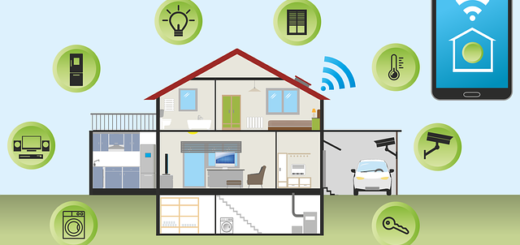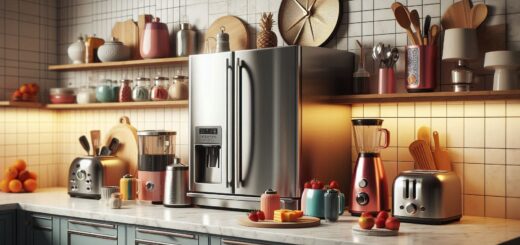Top 10 Tips to Organize Your Home for Maximum Efficiency
Organizing your home isn’t just about making it look aesthetically pleasing—it’s about creating an environment that fosters productivity, peace, and ease. A well-organized home can increase your efficiency, save you time, reduce stress, and even improve your overall well-being. Whether you’re tackling an entire house or just one room, efficient organization can make all the difference. In this article, we’ll explore the top 10 tips to organize your home for maximum efficiency, with practical advice that you can start implementing today.
Table of Contents
Why Organizing Your Home is Important
Before we dive into the tips, let’s talk about why organizing your home is so crucial. An organized home isn’t just about aesthetics; it’s about creating a space that enhances your productivity and mental well-being. Disorganization can lead to stress, wasted time, and even physical clutter that affects your health. An efficiently organized home, on the other hand, boosts your mood, saves you time, and helps you focus on what truly matters.
An organized home also makes it easier to maintain cleanliness, reduces the risk of losing important items, and allows you to optimize your space. Ultimately, the time and effort you invest in organizing your home will pay off in a more harmonious, functional living environment.
Steps to Take Before Organizing Your Home
Assess the Current Situation
Before you start moving furniture or buying storage bins, it’s important to take stock of your current space. Walk through each room and evaluate what’s working and what’s not. Take note of problem areas where clutter tends to accumulate, such as your closet, kitchen counters, or the garage.
Set Clear Goals
Having a clear vision of your goals is essential for a successful home organization process. Do you want to simplify your home? Maximize storage in a small space? Or create zones for specific activities? Write down your goals for each room, making them as specific as possible.
Declutter Before Organizing
You can’t organize clutter. Before you can think about putting everything in its place, go through each area and declutter. Purge items that no longer serve a purpose. This process can be emotional and overwhelming, but it’s crucial to reducing the overall mess.
Top 10 Tips to Organize Your Home for Maximum Efficiency
Now that you’re ready to start organizing, here are the top 10 tips that will help you achieve maximum efficiency in your home.
1. Start with a Plan: Map Out Your Space

Before you start organizing your home, it’s important to take the time to plan. Consider your goals, your lifestyle, and how each space in your home functions. A good organizational system starts with an understanding of your needs and a layout that makes sense for your daily routines.
Assess the Current Situation
Begin by identifying the problem areas in your home. Is your closet overflowing with clothes? Do you have a junk drawer that never stays organized? Take note of what needs the most attention and create a strategy for tackling it.
Determine Zones
Think about the different areas in your home and their functions. For example, create a dedicated zone for work in your office, a reading nook in your living room, and an efficient storage system in the kitchen. This can help streamline daily tasks and prevent clutter from accumulating.
Set Realistic Goals
Don’t try to organize everything at once. Set realistic goals for each room or area and break tasks down into manageable chunks. Having clear, specific goals will help you stay motivated and ensure that you see progress.
2. Declutter First: Less is More

The key to effective organization is decluttering. Before you even think about organizing your items, take a step back and assess what you truly need and use.
Let Go of Items You Don’t Use
Go through each room and get rid of items that no longer serve a purpose. If you haven’t used something in the last year or it no longer fits your needs, it’s time to part ways with it. This might include old clothes, unused gadgets, or excess paperwork.
Use the “One In, One Out” Rule
To prevent future clutter, implement the “One In, One Out” rule. For every new item you bring into your home, get rid of something similar. This ensures you don’t accumulate unnecessary items over time.
Categorize Your Belongings
Group items together based on their purpose. For example, all cleaning supplies should be in one area, while books can be grouped by genre or frequency of use. Categorizing helps make items easier to find when you need them.
3. Maximize Vertical Space: Use Wall Storage

Often, the most underutilized space in a home is the vertical space on walls. Instead of just focusing on horizontal surfaces, consider utilizing your walls for added storage.
Install Shelves
Wall-mounted shelves can free up floor space and give you extra room for books, decor, or storage baskets. Consider floating shelves or even taller shelving units for maximum storage potential.
Use Hooks and Pegboards
Hooks and pegboards are excellent for storing items like keys, bags, hats, or tools. Install them in entryways, closets, or even in the kitchen to help organize small items in a way that is easy to access.
Invest in Wall-Mounted Furniture
Wall-mounted desks, tables, or cabinets can help keep floor space clear and make rooms look less cluttered. This is particularly useful in smaller spaces where maximizing floor space is essential.
4. Invest in Smart Storage Solutions

Storage solutions are key to maintaining an organized and efficient home. There are many products on the market that can help maximize your space while keeping things accessible and orderly.
Use Multi-Functional Furniture
Furniture that serves multiple purposes is a smart way to maximize space and keep things organized. For example, ottomans that open for storage or a bed with drawers underneath can provide hidden storage for extra bedding or seasonal items.
Invest in Storage Bins and Baskets
Storage bins and baskets are ideal for organizing loose items that tend to accumulate in places like closets, bathrooms, or kitchens. Use clear bins for easy visibility, or label opaque bins for more uniform storage.
Use Drawer Organizers
In your kitchen, office, or bathroom, drawer organizers can keep smaller items neatly separated. These organizers are essential for maintaining an orderly space where things like cutlery, makeup, or office supplies don’t get lost in the shuffle.
5. Create Efficient Kitchen Organization Systems

The kitchen is often one of the busiest areas in the home, and keeping it organized can improve your efficiency when cooking, cleaning, and meal planning.
Use Clear Containers for Dry Goods
Storing dry goods such as flour, sugar, and pasta in clear, airtight containers can help keep your pantry organized and easy to navigate. This also reduces the chances of items getting lost in the back of the pantry or expiring.
Organize Utensils and Tools
Drawer organizers are great for utensils, but make sure to also designate a place for larger tools such as blenders, mixers, or cutting boards. Create a system that makes it easy to access the tools you use most frequently while keeping less-used items out of the way.
Label Everything
Labeling your pantry items, storage bins, and even spice racks ensures that everything has a designated spot. It will also help everyone in the household maintain the organization system long-term.
6. Implement an Efficient Cleaning Routine

An organized home is a clean home, and the best way to keep your home clean is by maintaining a regular cleaning routine. The key is to make it as efficient and sustainable as possible.
Create a Weekly Cleaning Schedule
Set aside time each week to clean key areas of your home. Breaking cleaning tasks down into manageable chunks (e.g., dusting, vacuuming, wiping down surfaces) helps prevent chores from piling up.
Keep Cleaning Supplies Accessible
Store cleaning supplies in a central location so you don’t waste time searching for what you need. You can also keep cleaning wipes or sprays in multiple rooms for quick touch-ups throughout the week.
Incorporate Daily Habits
Incorporating small habits, such as wiping down counters after cooking or making the bed every morning, can help you keep your home looking tidy and organized without much effort.
7. Organize Your Closet: Maximize Your Wardrobe Space

A well-organized closet makes getting dressed faster and more efficient. The key is to optimize the space you have and keep it functional.
Sort Clothes by Type and Season
Organize your clothing by category (e.g., shirts, pants, dresses) and rotate seasonal items to the front. This helps you quickly access the clothes you need, and it prevents out-of-season items from taking up unnecessary space.
Use Slim, Non-Slip Hangers
Slim, non-slip hangers can help maximize hanging space while keeping your clothes from slipping off and getting wrinkled. Uniform hangers also make your closet look neater and more organized.
Add Hooks or a Shoe Rack
Install hooks for accessories, bags, or scarves, and consider adding a shoe rack or shelf to keep your shoes neatly arranged and easy to access.
8. Create a Paper Management System

Paper clutter can easily accumulate in any household. To keep it under control, it’s essential to create an effective paper management system.
Sort Mail Immediately
As soon as you receive mail, sort it into categories such as “To Read,” “To Pay,” or “To File.” This helps prevent paper from piling up and makes it easier to stay on top of important documents.
Use File Folders or Binders
For long-term storage, use file folders or binders to keep important documents like bills, insurance papers, and tax documents organized. Label each folder clearly for easy access.
Digitize Important Documents
Whenever possible, scan and store documents digitally. This reduces the amount of physical paper in your home and makes it easier to find files when needed.
9. Keep Entryways Organized

Your entryway is the first thing you see when entering your home, and it sets the tone for the rest of the house. A well-organized entryway is key to maintaining an orderly home.
Use a Shoe Rack or Tray
Keep shoes organized and prevent dirt from being tracked throughout the house by using a shoe rack or a tray near the door. This helps contain the clutter and ensures your shoes stay in one place.
Hang Hooks for Bags and Jackets
Install hooks near the door for coats, bags, hats, and keys. Having a designated spot for these items ensures they don’t end up scattered around your home.
Keep a Catch-All Basket
Place a catch-all basket or tray on a console table where you can drop incoming mail, sunglasses, or small personal items. This helps keep your entryway neat and organized.
10. Maintain Organization with Regular Upkeep

Organizing your home is an ongoing process. To keep your home efficient and tidy, make sure to establish regular upkeep routines.
Perform Weekly Check-Ins
Set aside time each week to go over areas that tend to get cluttered, such as the kitchen counters or entryway. Perform a quick tidy-up to prevent clutter from accumulating.
Involve the Whole Family
If you live with others, involve them in the organizational process. Assign tasks or zones to different family members to ensure that everyone contributes to maintaining an efficient home.
Reevaluate Your Organization Systems
As your life and needs change, be sure to reevaluate your organizational systems. Don’t hesitate to make adjustments when something isn’t working or when your space feels overcrowded.
After Organizing Your Home: Tips for Maintaining Long-Term Efficiency
Once your home is organized, the real work begins: maintaining it. A well-organized space requires regular upkeep to ensure that it stays neat, functional, and efficient.
Establish Daily Habits
Incorporate small daily habits, such as making your bed, wiping down kitchen counters after meals, and sorting mail immediately. These small tasks prevent clutter from accumulating and help maintain the organization systems you’ve set up.
Regularly Reassess Your Systems
As your life changes, so will your organizational needs. Regularly reassess your home organization systems to ensure they are still serving your lifestyle. You may need to tweak or update certain areas as your needs evolve.
Stay Committed
Organization requires ongoing effort. Commit to keeping your home organized by setting aside time each week for tidying up and maintaining your systems. By staying proactive, you’ll ensure that your home remains efficient for the long term.
The Benefits of an Organized Home
An organized home isn’t just about aesthetics—it’s about improving your quality of life. Here are some of the key benefits:
Reduced Stress
Clutter can cause feelings of overwhelm and anxiety. A well-organized home fosters a sense of calm and control, which can help reduce stress.
Increased Productivity
When everything has a designated spot, you’ll spend less time searching for things and more time focusing on tasks. An organized home allows you to be more efficient in your daily routine.
Improved Mental Clarity
A clutter-free home creates a clutter-free mind. By organizing your space, you can think more clearly and focus better on the important things in life.
More Time for What Matters
When your home is organized, it takes less time to clean, maintain, and find things. This frees up more time for you to enjoy the things that matter most, such as spending time with loved ones, pursuing hobbies, or relaxing.
Frequently Asked Questions (FAQs) About Organizing Your Home for Maximum Efficiency
How do I start organizing my home if I feel overwhelmed?
If you feel overwhelmed, start small. Begin with one room or even one area of a room (e.g., a closet or desk). Set clear, achievable goals, such as decluttering for 30 minutes each day. Break down the tasks into smaller chunks and celebrate your progress as you go.
What should I do with items I no longer need?
Items you no longer need can be donated, sold, or recycled. For items in good condition, donate them to local charities or sell them online or at a garage sale. For items that are broken or no longer functional, consider recycling them or disposing of them responsibly.
How do I maintain organization once my home is organized?
To maintain an organized home, establish daily and weekly habits. Tidy up regularly by returning items to their designated places, perform small cleaning tasks every day, and schedule weekly check-ins to assess areas that tend to accumulate clutter. Staying consistent will help prevent disorganization from creeping back in.
Can organizing my home really improve my productivity?
Yes! An organized home can significantly improve your productivity by reducing distractions, saving you time looking for items, and creating a more focused and peaceful environment. When everything has a designated place, it’s easier to get tasks done efficiently without the chaos of clutter.
What’s the best way to organize a small space?
For small spaces, maximizing vertical space is key. Use shelves, hooks, and multi-functional furniture to create storage without taking up extra room. Consider using space-saving solutions like foldable furniture or under-bed storage. Be intentional about what you keep, and regularly declutter to ensure that your small space remains functional and efficient.
How can I organize my kitchen effectively?
To organize your kitchen effectively, start by grouping similar items together (e.g., baking supplies, utensils, canned goods). Use clear containers for pantry items to improve visibility. Invest in drawer organizers for utensils and labels for easy identification. Keep frequently used items within easy reach and store seasonal or less-used items higher or in the back.
Is it necessary to buy storage products to organize my home?
While storage products like bins, baskets, and shelves can be helpful, they’re not always necessary. You can often organize your home with what you already have. For example, repurpose old jars for storing small items or use cardboard boxes for sorting. However, if you want long-term organization and are working with limited space, investing in smart storage solutions may be worthwhile.
Conclusion: Start Organizing Your Home Today
The journey to an organized home doesn’t have to be overwhelming. By following these top 10 tips and taking a methodical approach, you can create a space that supports your lifestyle, improves your efficiency, and reduces stress. Remember, organizing is a process, and it’s okay to start small and work your way up. As you begin to implement these strategies, you’ll quickly see the positive changes in your home and life. Get started today, and enjoy the benefits of a more organized, efficient home!













